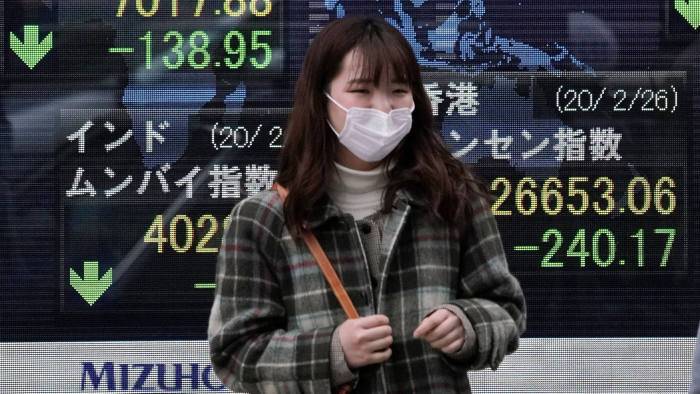Asian markets boosted by hopes on virus but oil dips

Stay tuned with 24 News HD Android App

Asian markets rose Monday as some of the world's worst-hit countries reported falling death rates, providing some much-needed hope in the battle against the coronavirus, though oil prices dipped after a meeting of top producers was delayed.
While the disease continues its deadly sweep across the planet, with more than 1.25 million now infected and nearly 70,000 dead, news out of Europe that fatalities were easing has lifted spirits on trading floors.
Italy reported its lowest daily toll in two weeks, while Spanish officials said deaths fell for the third straight day and France reported its lowest daily toll in a week.
Meanwhile, South Korea saw its fewest new cases in six weeks, Australian new infections were also dropping and Donald Trump said the US was showing signs of stabilising, despite the number of cases there passing 335,000 -- the highest in the world.
"Focus in markets will now turn to the path out of lockdown and to what extent containment measures can be lifted without risking a second wave of infections," said National Australia Bank's Tapas Strickland.
Lindsey Piegza, at Stifel Nicolaus & Co., told Bloomberg TV she was hopeful the crisis could be brought under control and the US economy reopened "by the end of April, early May".
"If that does occur, it's likely that we're able to control the downturn from a depressionary scenario into a recessionary scenario".
The relatively upbeat news lifted Asian markets, which shrugged off data Friday showing a massive drop in US jobs in March that added to news that millions of people had applied for unemployment benefits.
Tokyo, Sydney and Manila all rose more than four percent, while Seoul, Singapore and Jakarta gained almost four percent. Hong Kong jumped 2.2 percent. Taipei added 1.6 percent, while Shanghai was closed for a holiday.
London, Paris and Frankfurt all rallied out of the blocks in early trade.
'A long tunnel'
However, observers remain cautious as the US enters what Trump said would be "a time that's going to be very horrendous" with "some really bad numbers".
The country's Surgeon General Jerome Adams warned on Fox News: "This is going to be our Pearl Harbor moment, our 9/11 moment."
Erik Nielsen, of UniCredit SpA, said: "There is light at the end of the tunnel but it's still a long tunnel."
Attention this week will be on a planned meeting of OPEC and other key crude producers aimed at easing a supply glut that has sent oil prices crashing. Both main contracts soared last week as Trump said Saudi Arabia and Russia would hold talks on ending their price war, while it also emerged OPEC would be holding a teleconference on Monday.
However, investors were dealt a blow over the weekend when the meeting was delayed to Thursday, while analysts said there were doubts that the US would take part in them, which could be a major sticking point for Moscow and Riyadh.
"If the Americans don't take part, the problem which existed before for the Russians and Saudis will remain -- that they cut output while the US ramps it up, and that makes the whole thing impossible," Fyodor Lukyanov, a Kremlin adviser, said.
But even if a deal is reached, there is widespread scepticism that suggested cuts of 10 million barrels a day will be enough to help the oil market, owing to a collapse in demand caused by the pandemic. "The likelihood of a deal being done is extremely low," Daniel Hynes, at Australia & New Zealand Banking Group, said. "Certainly the type of agreement you'd need to stabilise the market is a long shot given how much demand has been hit."
Prices fell Monday, though they managed to pare early losses. On currency markets the pound faced early pressure after news broke that British Prime Minister Boris Johnson had been admitted to hospital as a "precautionary step" as he had failed to shake off coronavirus symptoms after 10 days.
However, the unit recovered as the day wore on with officials insisting he was "still very much in charge of the government".
